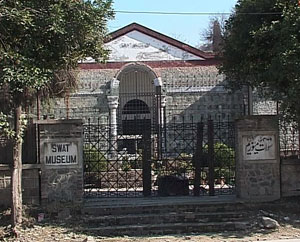ISLAMABAD - The 200-year old Buddhist heritage in South Western city of Pakistan - Swat, is now in danger with local Taliban militants threatening to destroy the regions one of the precious museums, media reports here said.
The Taliban has threatened to wipe out the symbols of pre-Islamic cultures in Swat and the museum has become a prime target of the militants - a repository of relics dating as far back as to the 3rd century BC, the Dawn reported this week (Wednesday).
Swat valley and other surrounding areas of South Western Pakistan have been heavily rich with Buddhist monuments and archeological sites for many centuries. The area had also been a main attraction of religious tourists - mainly Buddhists from Japan for many decades, but not anymore due to the prevailing highly dangerous security situation in the region.
 |
| The besieged Swat museum which is now under the threat of Pakistani Taliban. It houses pre-Islamic heritage, mainly Buddhists artifacts and Buddha statue of Gandhara era. "The museum will be reopened only after peace returns to the valley," says its Curator Aqleem. But it must be protected from Taliban, too, to be reopened. Picture Courtesy - Dawn (Islamabad) |
Swat museum is rich with many pre-historic artifacts and statues mainly belonging to the Buddhist civilization of the South Asian region. Its Buddhist statues are supposed to be the few remaining representations of the Gandhara art.
Pakistani troops have launched a massive hunt on local Taliban group in Swat led by Maulana Fazlullah and the group last week attacked and destroyed a hostel of a ladies school saying its 'haram' for women to go to schools. Local Taliban and tribal militant groups are becoming extremely dangerous elements in rural areas of Pakistan, mainly in Swat, Quetta, FATA (Federally Administered Tribal Area) and North Western Frontier Provinces (NWFP).
In November 2007, the militants blew up a historic Buddha statute in the Jihanabad area of Swat causing irreparable damage to the seven-meter tall historic statue.
"This was the second attack on the seventh century statue of Buddha," Dawn quoted Mohammad Aqleem, the Curator of the Swat Museum. The attack had caused severe damages to the head of the statue and also to its shoulders. "It was a most complete and inspiring symbol of Gandhara art," grim looking Aqleem has told Dawn reporter. After the destruction of the Bamiyan Buddha statue of Afghanistan in March 2001, the meditating statue in Swat was the most precious one, according to the Curator.
Pakistani troops have established a camp surrounding the museum in the wake of threats by the Fazlullah-led Taliban — creating a virtual military fortress covered with sand bags and heavily fortified bunkers.
The heavy military presence itself could be an attraction to the Taliban militants, says Mohamad Amir Rana, the head of the Islamabad based think-tank, Pak Institute of Peace Studies (PIPS).
"They would attack the museum under the pretext of attacking the military camp. They are extremely capable of unleashing successful attacks against such military compounds," said Rana.
The museum which was founded in 1959 by the then Head of Swat was designed by an Italian architect, Vittonio Cardi and then renovated with the financial assistance from Japan in 1992.
An explosion last year has damaged more than 150 valuable artifacts of the museum. "On the other hand destroying pre-Islamic cultural heritage like historic Buddha statues will bring them more international attention — compared to killing of dozens of military men or civilians. That's exactly what they did with Bamiyan Buddha in March 2001," he added.
It's the duty of the government, according to Rana, to protect these invaluable Buddhist heritages, but whether it is capable of doing so is the larger issue. These historic artifacts and statues are under threat by two factors - the Taliban militants and the smugglers.
"There are suggestions to move some of the valuable items to Taxila, but that will expose them to the smugglers — another danger looming around Taxila," Rana added.
Taxila (Thakshila - former Buddhist centre for academic excellence), situated some 40 kms away from Islamabad, is one of the main tourist attractions in Pakistan. |

